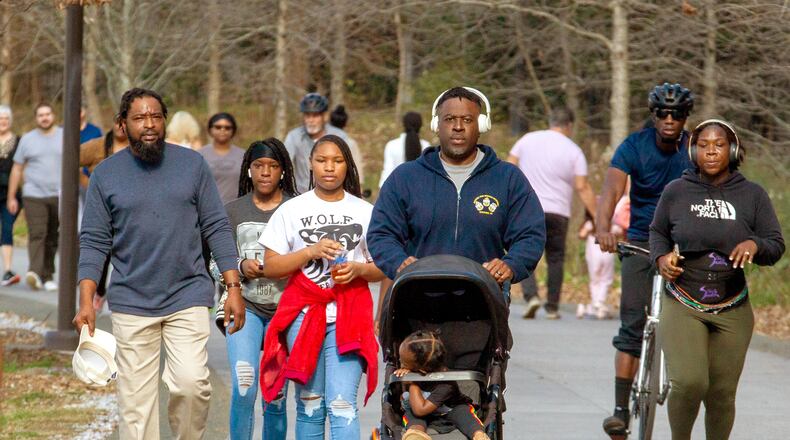Continuing its efforts to boost health equity for residents living along the 22-mile ring circling the city’s intown neighborhoods, the Atlanta Beltline Partnership (ABP) is teaming up with a few organizations for monthly health fairs this summer and early fall.
The Sunday events, which begin June 2 in Westside Park, bring free services and resources to area residents who might not otherwise be able to afford or have access to them.
ABP, which raises funding and awareness for the Beltline project, aims to “empower and improve health equity and outcomes, particularly for underserved communities on the Westside,” said Michael Davis, deputy executive director of the nonprofit. The Westside runs from West Midtown to Atlantic Station and includes the neighborhoods of Grove Park, Bankhead, English Avenue, Vine City, Washington Park, West End, Rockdale, and Hunter Hills.
“We are trying to promote movement, healthier lifestyles and improved quality of life,” Davis said.
This is the first time ABP is partnering with the Fulton County Board of Health (FCBOH), the American Heart Association (AHA), and Level3 Yoga with a focus on community-based health and wellness, Davis explained.
ABP previously sponsored family play days that also provided health information and currently hosts smaller wellness events with other community partners, such as Free Family Fitness, 30-minute sports play for children and their caregivers, and Walk with a Doc, physician-led walks throughout the city.
Residents will be able to participate in free yoga and CPR classes and learn more about such issues as disease prevention, childhood nutrition, teen pregnancy, mental health, in-home health care, and affordable health insurance.
The upcoming health fairs will initially target the Westside. The historically Black community includes lower income residents, some who lack access to social services, according to event partners.
Black and Hispanic residents are less likely to receive CPR training, according to AHA. Then there’s the lower average life expectancy of some Westside residents. A report by Georgia Health News found that residents of the English Avenue neighborhood in Westside lived to 64, on average, compared to 87 for some residents of Buckhead’s Margaret Mitchell neighborhood.
“This data clearly demonstrates how factors such as social support, financial resources, education, employment, and stable housing — classified as social determinants of health — affect Atlantans’ ability to access adequate health care, adopt healthy behaviors, and live in a healthy environment,” said Shana Scott, vice president of community impact for the metro Atlanta AHA.
“These disparities are often overlooked in traditional clinical and preventive care, yet they play a significant role in influencing health outcomes, specifically in CPR,” Scott said.
Audrey Cash, founder of Level3 Yoga and a former FCBOH health educator, proposed the idea of health fairs to the ABP after leading free outdoor yoga classes on the Beltline for the past two years. She previously coordinated and provided health education at health fairs for FCBOH.
The Beltline health fairs provide services to communities largely made up of minorities that might not have access to primary care doctors or technology necessary to sign up for services such as affordable health insurance, Cash said.
The health fairs also expand upon ABP’s work with Westside residents to improve financial stability and wealth building.
Last year, through a Neighbor to Neighbor partnership involving ABP, more than 30 canvassers connected 10,000 residents in 10 Westside communities with resources to improve their lives and help them afford to stay in the area, Davis said. Various Atlanta nonprofits offered such services as home repairs, legal representation to prevent displacement, and property tax, down payment and closing cost assistance.
Residents who may have lived in the area for decades and have watched their property values rise may not be able to afford the increase in property taxes, making them vulnerable to displacement, he said.
A 2018 feasibility study of the Beltline’s Legacy Resident Retention Program identified equity priority planning areas on the Westside and Southside, where longtime residents were vulnerable to displacement, Davis explained. The retention program helps “to keep residents in their homes and position them for generational wealth-building outcomes by paying property tax increases through the 2030 tax year.”
HouseATL, which advocates for affordable housing, recently recognized the Beltline partnership ABP as its 2024 Housing Retention Hero for its efforts to prevent displacement of longtime residents, which allows them to age in place.
While the health fairs will begin in the Westside, they will be used as a model for other areas around Atlanta, Davis said. Health fairs in Westside Park are planned for June 2, July 7, Aug. 4, Sept. 8, and Oct. 6.
Beltline Health Fairs
The Atlanta Beltline Partnership is sponsoring five monthly health fairs this summer and early fall.
4-8 p.m. June 2, July 7, Aug. 4, Sept. 8, and Oct. 6. Registration is not required. Westside Park upper entrance, 1660 Johnson Road NW, Atlanta. To learn more, visit beltline.org/event/westside-community-health-fair/2024-06-02/.
About the Author
Keep Reading
The Latest
Featured


